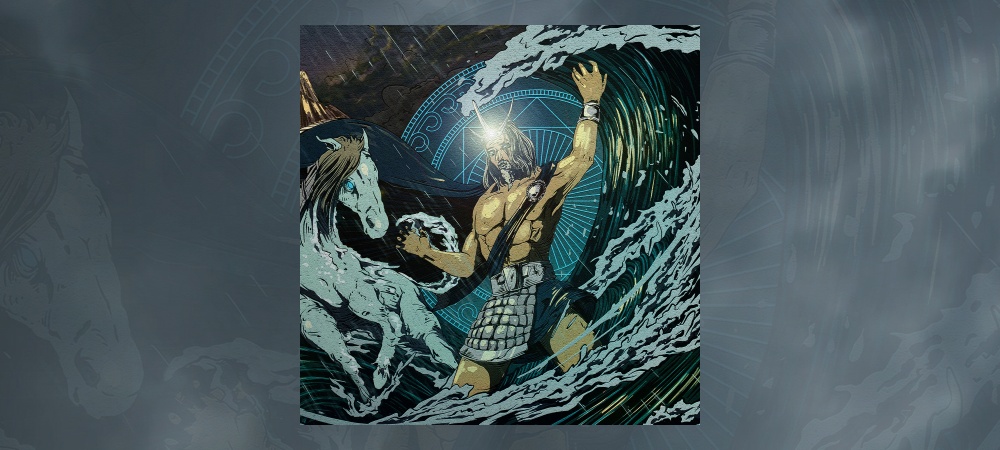Well here’s a thing! Since it appears that At The Mercy of Manannán is Irish prog band M-Opus’s third album, I’m wondering how I’ve missed hearing them until now. And whilst I say it’s their third album, since they have an imagined catalogue and are releasing albums out of strict chronological order, it might not be. Confused? OK, M-Opus are a real band making music right now, but they have a theoretical history, and this is supposed to be their 1972 release. For the record, the first album Triptych was from 1975, and the epic follow-up Origins was from 1978. You can’t get much more prog than this, right?
Having sorted out the history, let’s get back to At The Mercy of Manannán, the latest offering from this unique group. I’ve been playing this album for a few weeks now, and have been so engrossed with it, I almost forgot I was supposed to be reviewing it! I think it’s fair to say that this record sounds as though it could have been recorded in 1972, yet it sounds fresh and vital as anything I’ve heard this year. The instrumentation and sounds do evoke the Seventies, and on top of that, this is a concept album, but I have to say that if I’d heard this album in 1972, my young mind would have been truly blown. The story, as far as I can work out, follows a group of warriors who set sail to challenge their foes and save the people they have left behind. They encounter mythical Celtic gods along the way, such as Manannán Mac Lir (Son of the Sea), but the storytelling is sufficiently vague as to leave plenty to the imagination. One song, Na Bruídaí (The Brides), is actually sung entirely in the Gaeilge language, and as such is tricky to follow, but adds to the authenticity of the band’s roots.
The music however is what you need to know about, and it is varied and excellent throughout. The intro piece Setting Off has a lovely 12-string guitar opening, and sets the scene for the voyage in a rather Hackett fashion, before Riverflow erupts with a proggy flourish. The chorus has a lovely Yes-like vibe, with drums and bass driving the rhythm while Mellotron and organ give that authentic Seventies sound. Although there are clear nods to bands from that era, the music never retreads tired clichés, so whilst Riverflow definitely reminds me of Yes in their prime, it doesn’t actually sound like anything they recorded. Watery sound effects lead us seamlessly into Whirlpool, a jazzy instrumental, with some tasty guitar from PJ O’Connell and Colin Sullivan, and thunderous drums from Mark Grist. The keys and vocals are courtesy of Jonathan Casey, who seems to be the main driving force behind M-Opus, and it’s his invention which is a key element to the success of this album. No two tracks sound the same, although there is an overarching recognisable identity to their style.
Our mariners reach the open sea as the story is picked up again on To the Other Side, and things get mysterious and weird, both lyrically and musically. When Casey’s Hammond riff erupts part way through, it’s pure Van der Graaf for a few moments, but the elegiac closing segment is back to the Yes influence again as the track winds up to a climax; it’s just magical. Na Bruídaí is rockier, and unless you understand Irish Gaelic, hard to understand! The words have a lovely lilt though, so it’s no problem, and rather a nice nod to the storyline to be honest. Did I mention that the Isle of Man gets its name from Manannán? Or is it the other way around? No matter. The music sounds busy and angry on this piece, so I’m guessing that our heroes are kicking ass to some kind of foe, but I could be wrong. Valley of Elah follows, and is a bit more psychedelic in style, and at four minutes, is an outstanding piece of concise Seventies prog, only bang up to date of course. It has a dreamy feel and a memorable ‘Sha La La’ chorus; very Moodies!
Sealing Novas has an ominous feel, as the story is concluded. Or is it? It’s slightly ambiguous, and I wouldn’t rule out their 1973 album being a sequel! I rather hope that is the case, as the only real criticism I have is that this album is over too soon! Another instrumental concludes proceedings and is an inventive romp, with tricky time signature changes and a playful other-worldly feel. It precisely sums up how unique M-Opus are, and why I’ve been so engrossed in this album I’ve lost track of what year it is.
In conclusion, the lyrics on At the Mercy of Manannán are poetic, but oblique enough to be open to interpretation, which makes a conceptual work more listenable to my mind. Musically, it delves back to the Seventies as many bands do, but in a way which copies nobody, and manages to sound contemporary and relevant. It’s exactly the right way to acknowledge influences whilst creating new music, and the musicianship is top drawer. You aren’t going to hear another prog concept gem based on Manx mythology this year, that’s for sure. Make sure you give this one a listen, it’s highly recommended.
TRACK LISTING
01. Setting Off (2:03)
02. Riverflow (6:45)
03. Whirlpool (3:13)
04. To the Other Side (9:04)
05. Na Bruidai (7:56)
06. Valley of Elah (4:08)
07. Sealing Novas (3:09)
08. Carnivale (5:15)
Total Time – 41:31
MUSICIANS
Jonathan Casey – Vocals, Keyboards, Bass
Mark Grist – Drums
PJ O’Connell – Guitar
James Dunne – Bass
Colin Sullivan – Guitar
ADDITIONAL INFO
Record Label: Independent
Country of Origin: Ireland
Date of Release: 23rd April 2023
*M-Opus release albums from the band’s imagined, historical discography. At The Mercy of Manannán is their 1972 album.

